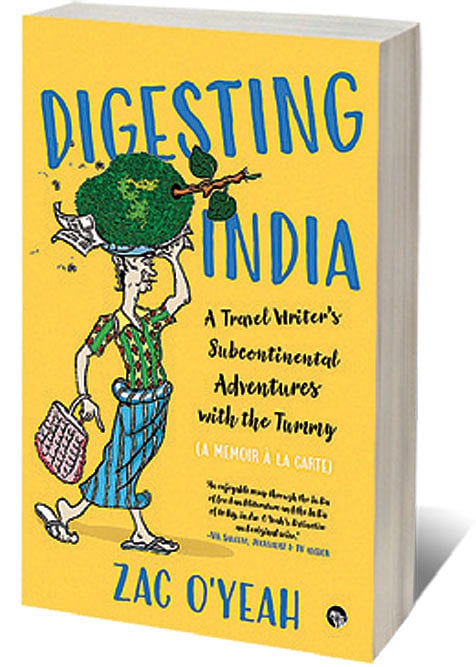Tasting Time

BENGALURU-BASED Scandinavian-origin novelist, Zac O’ Yeah introduces Digesting India as a “panegyric to Indian hospitality, to eating and travelling and to enjoying food on the road...”
Call it The Rough Guide to Indian Food, from railway stations through Iranian cafes and golgappa carts, to the downmarket bars of Thimphu, “the most beautiful things I’ve ever seen.” Zac fell in love with the drinking dens, drank a six-pack of Red Panda beer, apparently the minimum required to get used to its yeasty taste, read Bhutanese newspapers, and “acted Buddhistic.”
Just how rough the guide gets, you can anticipate from the travel rules he frames: 1) Carry Imodium (lots of) 2) Learn to adjust, (use coconut groves if necessary), and 3) Give the most traumatic experiences names like ‘Fred’.
The scale for said traumatic experiences is marked in t.t.b/h, or trips to bathroom per hour. The world record is apparently 37. Clearly, the book does not cover the same ground as restaurant reviews in the weekend glossies. Food delivery apps are swiftly dismissed— “culinary malware—clickable edibles and mass-manufactured monotonous meal kits”.
Zac’s language is always playful. Between the search for Malgudi, and teatime in Calcutta’s New Market, he describes the daily caffeine dose on the International Space Station as “recycled-urine-mixed coffee with dehydrated cream.” Gross, but factual, even if you dismiss his claim that the provenance of the coffee was the sole reason his Swedish friend backed out of the space race.
Openomics 2026: Continuity and Conviction
06 Feb 2026 - Vol 04 | Issue 57
The performance state at its peak
In his many years in India, Zac has also acquired endearing Indianisms, like “veg” and “nonveg”, or “eating 5-star”, usage you won’t find elsewhere in the English-speaking world. So, when you survey his dosa route through Karnataka and Tamil Nadu, or sniff over his shoulder in Chandigarh, at a tandoori chicken of “classic honest-to-goodness simplicity”, you’re travelling with a foreigner, albeit a nativised one, with a sharp eye for the incongruous.
Though the book is described as “sub-continental adventures with the tummy”, it has a strong literary strand, to be expected from a bibliophile and crime-writer, in love, not just with dubious Bhutanese dives, but also with Bengaluru. His first chapter is a paean to the city he has made home, featuring Ramachandra Guha and Rajmohan Gandhi, Winston Churchill and HRF Keating, and Lisbeth Salander, who first appeared in The Girl with the Dragon Tattoo. After exploring the heritage of beer in India’s pub city, Zac takes you to a dance bar, which he describes as a euphemism for “striptease without removing garment”, then back to his native Swedish for the origin of the word ‘offal’, which triggers an important culinary journey into the ‘sparepart’ dishes of Bengaluru, featuring the hypnotising eyes of goats, and dishes such as haleem, gurda, and kaleji.
Then, in another thread that runs through the book, he explores the remains of the Anglo-Indian culture. He visits the Kolar Gold Fields, where the club was a British island, a “make-believe place(s) simulating home”, with mildewed books, snooker tables, and “dusty heads of rotting animals on walls.” The KGF club no longer features the Eurasian cuisine of its heyday, but Zac’s interests are wide-ranging, and in Calcutta, he takes us to the Park Street Cemetery, “a calming counterpoint to the glitzy tap-dancing highlife of Park Street”, and reminds us that William Thackeray was born in Free School Street; then, talking to an Anglo-Indian aunty, reminds us that both Engelbert Humperdinck and Cliff Richard were born in India.
Zac’s gustatory indulgences are as wide-ranging as the Indian topography, and he salivates over everything from mahi-mahi and shrimp in Puducherry to shamudatsi in Bhutan. My indulgences are severely restricted by being vegetarian, but we concur on one fact—dosas are divine.
And, even though my tolerance for spicy food is vanishing, I share his thoughts on the bland, here expressed through Verrier Elwin’s words on ashram food: “Oh food inedible, we eat thee, / Oh drink incredible, we greet thee, / Meal indigestible, we bless thee.”

